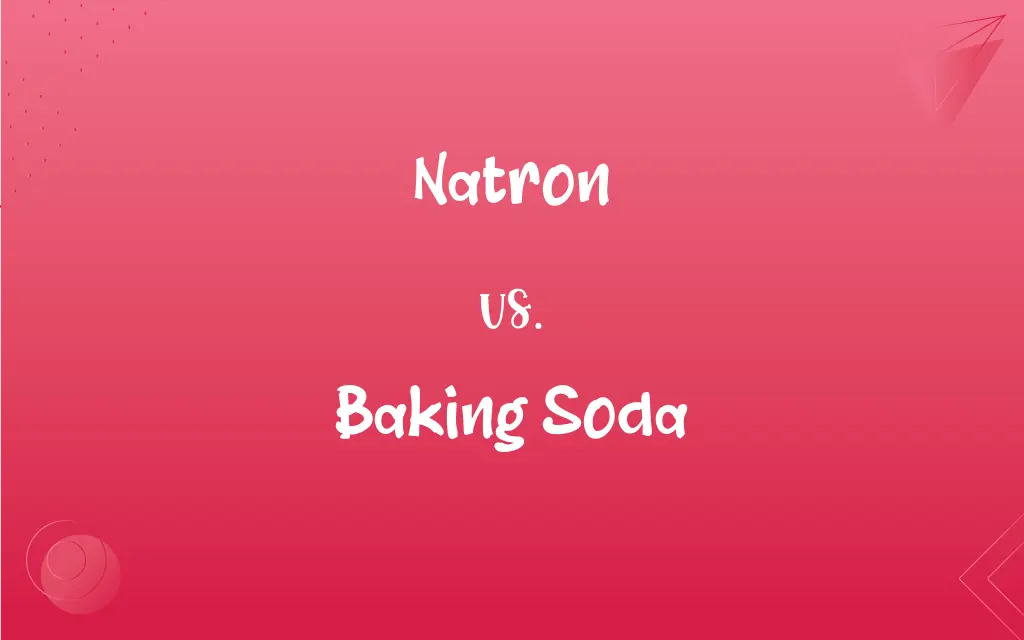Natron vs. Baking Soda: What's the Difference?
Edited by Aimie Carlson || By Janet White || Published on December 2, 2023
Natron is a naturally occurring mineral mixture, primarily of sodium carbonate, while baking soda is pure sodium bicarbonate, a refined and processed compound.

Key Differences
Natron is a naturally sourced mineral, predominantly composed of sodium carbonate, sodium bicarbonate, and small amounts of sodium chloride and sodium sulfate. Baking soda, on the other hand, is a refined product, chemically known as sodium bicarbonate, and is produced through a controlled industrial process.
Historically, natron was used by ancient civilizations for mummification and as a cleansing agent due to its desiccating and antimicrobial properties. Baking soda, however, gained popularity in modern times primarily as a leavening agent in baking, owing to its ability to produce carbon dioxide when mixed with an acid.
Natron, being a mixture, has varied chemical properties depending on its composition, which can include the efflorescence of sodium carbonate. Baking soda is a single chemical compound, sodium bicarbonate, known for its consistent and predictable chemical reactions, such as neutralizing acids.
In everyday life, natron can be used for cleaning, as a deodorizer, or in some traditional medicine practices. Baking soda is widely used in cooking, as a cleaning agent, for personal hygiene in toothpaste, and as an antacid.
Natron, less commonly found and utilized in contemporary times, can be sourced from natural deposits. Baking soda is widely available in grocery stores and is a common household item in many homes around the world.
ADVERTISEMENT
Comparison Chart
Chemical Composition
Mainly sodium carbonate, with sodium bicarbonate, chloride, and sulfate
Pure sodium bicarbonate
Primary Use
Historically for mummification and cleaning
Commonly used in baking and as a cleaning agent
Origin
Natural mineral deposit
Industrially produced compound
Acidity Reaction
Varied due to mixed composition
Reacts consistently to neutralize acids
Modern Availability
Less commonly available
Widely available in stores
ADVERTISEMENT
Natron and Baking Soda Definitions
Natron
Natron is a natural mineral salt primarily composed of sodium carbonate.
The ancient Egyptians used natron in the mummification process.
Baking Soda
Baking soda is used as a cleaning agent due to its abrasive and deodorizing properties.
I cleaned the sink with baking soda to remove stains.
Natron
Natron serves as a desiccant and antimicrobial agent.
Natron was historically used to preserve food due to its desiccating properties.
Baking Soda
Baking soda is used in personal care products, like toothpaste, for its mild abrasive quality.
Baking soda in toothpaste helps in gently removing plaque.
Natron
Natron has been used in various traditional cleaning applications.
Natron was added to bathwater in ancient times for its cleansing properties.
Baking Soda
Baking soda is a white crystalline powder that is a form of sodium bicarbonate.
She added baking soda to the cake batter to make it rise.
Natron
Natron is a white to colorless mineral, often found in saline lake beds.
In their natural state, natron deposits appear as efflorescent crusts on lake beds.
Baking Soda
Baking soda acts as a leavening agent in baking.
Baking soda reacts with acidic ingredients to produce carbon dioxide, which helps dough rise.
Natron
Natron can be used as a natural insecticide.
Gardeners sometimes use natron to deter pests from plants.
Baking Soda
Baking soda can neutralize acids, making it useful as an antacid.
He used a spoonful of baking soda in water to relieve heartburn.
Natron
A mineral of hydrous sodium carbonate, Na2CO3·10H2O, often found crystallized with other salts. It can act as a desiccant and was used in mummification.
Natron
(mineral) A crystalline mixture of hydrous sodium carbonate and sodium bicarbonate, with the chemical formula Na2CO3·10H2O.
Natron
Native sodium carbonate.
FAQs
Can natron be used in baking like baking soda?
Natron is not typically used in baking due to its varied composition, unlike the consistent leavening action of baking soda.
Is baking soda natural or synthetic?
Baking soda is a synthetic compound, industrially produced from natural minerals.
Is natron safe for consumption?
Natron is not generally considered safe for consumption due to its high alkalinity and varied composition.
What is baking soda's chemical name?
Baking soda is chemically known as sodium bicarbonate.
Can baking soda be used for cleaning?
Yes, baking soda is effective as a cleaning agent due to its abrasive and deodorizing properties.
What is natron made of?
Natron primarily consists of sodium carbonate, with traces of sodium bicarbonate, chloride, and sulfate.
Can baking soda relieve heartburn?
Yes, baking soda can act as an antacid and neutralize stomach acid, providing relief from heartburn.
Where is natron typically found?
Natron is found in natural deposits, often in dry lake beds in arid regions.
Is baking soda environmentally friendly?
Baking soda is generally considered environmentally friendly and non-toxic.
Were there historical uses for natron?
Historically, natron was used in mummification and as a cleansing agent in ancient civilizations.
Can baking soda be used in personal hygiene products?
Yes, baking soda is used in toothpaste and deodorants for its mild abrasive and deodorizing qualities.
Is baking soda effective in pest control?
Baking soda can be used as a mild insecticide, especially in garden applications.
What is the shelf life of natron?
Natron, if kept dry, can have an indefinite shelf life, similar to other mineral salts.
Is natron still used today?
Natron is less commonly used today but still finds applications in certain traditional practices and as a cleaning agent.
Can baking soda expire or lose its potency?
Over time, baking soda can lose its potency, especially if exposed to moisture or contaminants.
Can natron be used as a deodorizer?
Yes, natron can be used as a deodorizer, similar to baking soda.
Can natron replace baking soda in recipes?
Natron should not replace baking soda in recipes as it has different chemical properties and reactions.
Is baking soda soluble in water?
Yes, baking soda is soluble in water, though not as highly as some other salts.
How does baking soda react with acids in baking?
Baking soda reacts with acidic ingredients to produce carbon dioxide gas, which helps dough rise.
What are the health risks of using natron?
Ingesting natron in large amounts can be harmful due to its high sodium content and alkalinity.
About Author
Written by
Janet WhiteJanet White has been an esteemed writer and blogger for Difference Wiki. Holding a Master's degree in Science and Medical Journalism from the prestigious Boston University, she has consistently demonstrated her expertise and passion for her field. When she's not immersed in her work, Janet relishes her time exercising, delving into a good book, and cherishing moments with friends and family.
Edited by
Aimie CarlsonAimie Carlson, holding a master's degree in English literature, is a fervent English language enthusiast. She lends her writing talents to Difference Wiki, a prominent website that specializes in comparisons, offering readers insightful analyses that both captivate and inform.






































































